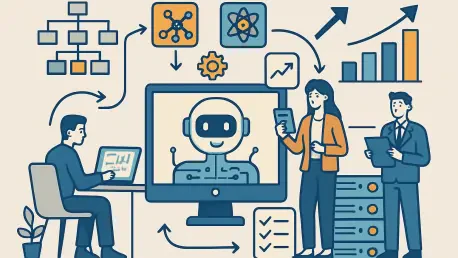In today’s fast-evolving corporate world, AI technologies are revolutionizing business operations, creating unprecedented efficiencies across various sectors. An AI startup named Dust, headquartered in San Francisco, has emerged as a trailblazer in this arena. Dust’s innovative approach to automating and optimizing enterprise workflows positions it as a frontrunner in transforming conventional business processes. This market analysis dives into Dust’s impact, reflecting the profound changes AI agents introduce in enterprise landscapes, and examines what future trends might look like.
AI Innovations Driving Operational Excellence
The dawn of AI technologies in the business domain was marked by simple chatbot applications serving basic functions. Rapid technological advancements have paved the way for complex AI agents with the capacity to execute multifaceted tasks. Enterprises are now witnessing a substantial shift in operations, driven by intelligent agents capable of significantly enhancing productivity. With Dust’s AI solutions, mundane workloads are being automated, boosting both efficiency and effectiveness in various business processes.
Strategic Positioning and Growth Trajectories
Dust’s market strategy involves leveraging advanced language models, such as those from the Claude suite by Anthropic, to build specialized enterprise tools. This strategic utilization not only propels Dust’s solutions to the forefront of AI integration in business settings but also underscores its unprecedented growth. Achieving $6 million in annual revenue demonstrates Dust’s growing influence and acceptance in the increasingly competitive AI market. As businesses seek to integrate cutting-edge technologies to optimize workflows, Dust occupies an influential position in shaping these advancements.
Adapting to a Dynamic Market: Challenges and Opportunities
Enterprises encounter challenges related to AI adoption, including concerns about security and effective implementation. Dust addresses these hurdles by incorporating the Model Context Protocol (MCP), ensuring secure interactions between AI systems and enterprise data. This architecture facilitates seamless integration while safeguarding critical information. Delving into regional differences and sector-specific innovations, Dust’s approach remains adaptive, capturing market-specific needs and fostering AI acceptance across diverse environments.
Forecasting AI’s Evolutionary Pathways
The trajectory of enterprise AI remains poised for continued evolution. As regulatory frameworks adapt and technology further advances, AI integration will become indispensable. Experts anticipate these changes will result in AI-driven solutions becoming integral components of traditional business models. Future considerations include potential developments that could redefine roles within organizations, shifting AI agents from auxiliary tools to essential players in the enterprise ecosystem.
Recommendations for AI Integration
To harness the transformative potential of AI, enterprises require comprehensive strategies for implementing AI solutions. Dust’s successful journey offers a blueprint for enterprises seeking optimized workflow integration. By prioritizing actionable AI tools and understanding market dynamics, businesses can achieve substantial productivity improvements. Practical recommendations include establishing clear objectives, investing in secure AI frameworks, and fostering a culture open to technological innovations.
Reflecting on Dust’s Market Influence
Reflecting upon Dust’s accomplishments, its innovations signify a pivotal movement in enterprise AI. By integrating advanced AI into everyday business operations, Dust exemplifies the potential for AI agents to redefine productivity and efficiency in corporate settings. The implications of Dust’s advancements showcase a future where AI tools are essential collaborators in achieving business goals, underscoring the importance of embracing these transformative technologies for sustained enterprise success.









